Photo: Scott Gries/NBA/Getty Images
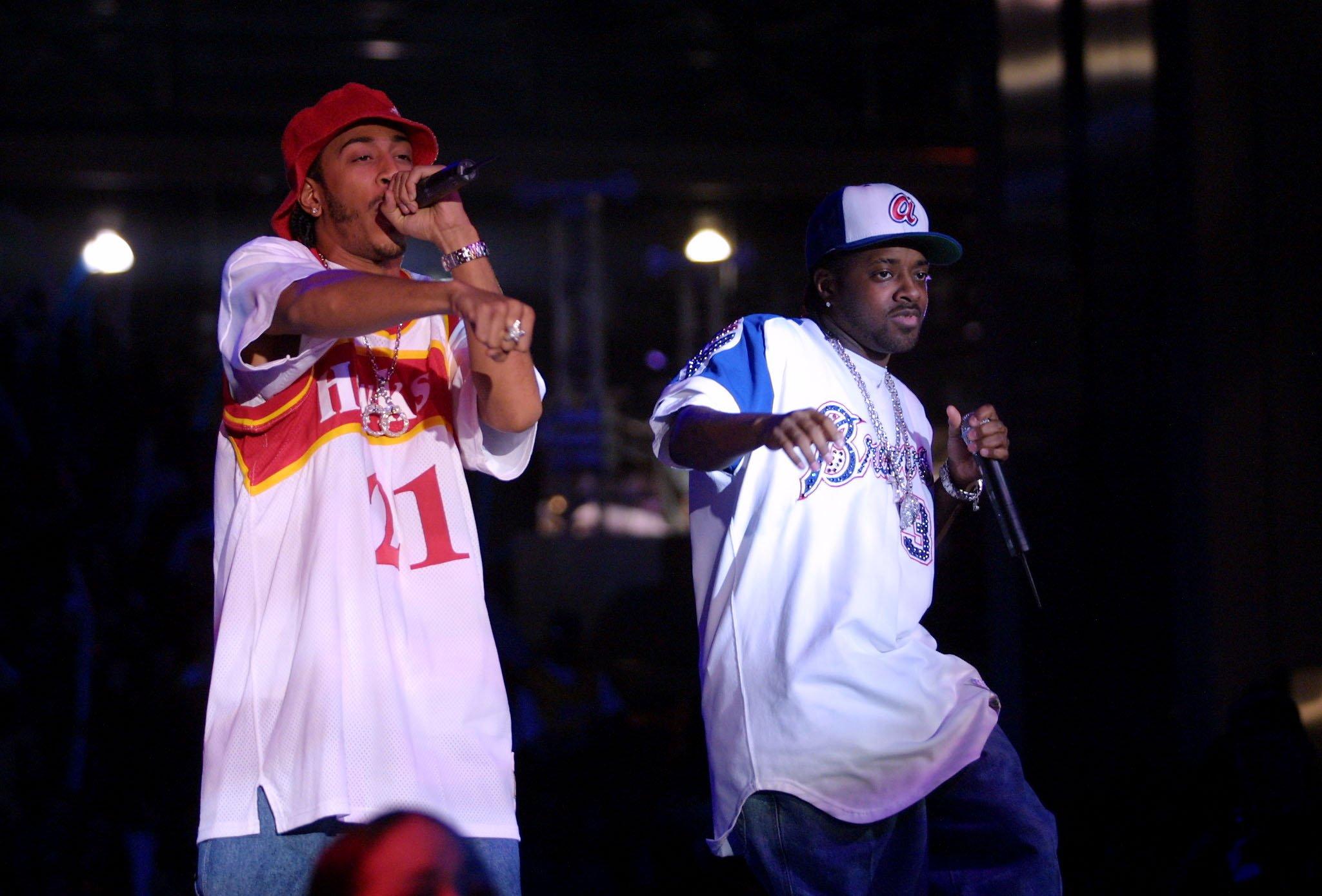
Ludacris and Jermaine Dupri
news
Looking Back On Classic Songs Blessed By Jermaine Dupri
As the GRAMMY Museum celebrates 25 Years of Jermaine Dupri & So So Def, we take a look back on the classics he penned
The multi-talented, GRAMMY-winning music mogul Jermaine Dupri has been making waves in the music world from a young age, beginning with launching Kris Kross into fame when he was just 19 years old. Dupri wrote and produced their debut hit single, "Jump," and has contributed in some capacity to way too many hits to count since his early days.
He is also only the second hip-hop artist (Jay-Z was the first in 2017) inducted into the Songwriters Hall of Fame. On the eve of the opening of the GRAMMY Museum's new exhibit showcasing his contributions to music, we take a trip down memory lane, looking at our favorite songs that Dupri either wrote or co-wrote.
"Jump" – Kris Kross (1992)
<iframe width="620" height="349" src="https://www.youtube.com/embed/010KyIQjkTk?rel=0" frameborder="0" allow="autoplay; encrypted-media" allowfullscreen></iframe>
You can't talk about Dupri's beginnings as a writer/producer without mentioning Kris Kross, the duo of 12 year olds he discovered at the mall and signed to his new label. The first song that he wrote and produced for them, "Jump," gave them almost instant fame as it shot to No. 1 on the Billboard Hot 100. The song was nominated for Best Rap Performance By a Duo Or Group at the 35th GRAMMY Awards.
"Always Be My Baby" – Mariah Carey (1995)
<iframe width="620" height="349" src="https://www.youtube.com/embed/LfRNRymrv9k?rel=0" frameborder="0" allow="autoplay; encrypted-media" allowfullscreen></iframe>
A young Mariah Carey collaborated with Dupri for the first time on her widely successful fifth studio album, Daydream, which he helped produce with legendary R&B artist/producer Babyface. Dupri and Carey co-wrote her now-classic single together, "Always Be My Baby," along with regular Dupri collaborator Manuel Seal, Jr. The single was nominated for Best Female R&B Vocal Performance at the 38th GRAMMY Awards, where she received six nominations in all for the album and its singles.
"You Make Me Wanna" – Usher (1997)
<iframe width="620" height="349" src="https://www.youtube.com/embed/bQRzrnH6_HY?rel=0" frameborder="0" allow="autoplay; encrypted-media" allowfullscreen></iframe>
An up-and-coming Usher worked with Dupri for the first time on his hit sophomore album, My Way. The two co-wrote the classic "You Make Me Wanna" together, along with Seal, Jr. Dupri and Babyface teamed up again, co-producing the track, along with other tracks on the album. Usher received his first GRAMMY nod for the single, which was nominated for Best Male R&B Vocal Performance at the 40th GRAMMY Awards.
"Welcome to Atlanta" – Jermaine Dupri ft. Ludacris (2001)
<iframe width="620" height="349" src="https://www.youtube.com/embed/j5W73HaVQBg?rel=0" frameborder="0" allow="autoplay; encrypted-media" allowfullscreen></iframe>
Dupri has also released his own music as a rapper, including the early-2000s classic "Welcome to Atlanta" with Ludacris. The song was featured on both artists' sophomore albums, on Dupri's Instructions and on Ludacris' Word of Mouf as a hidden track. Dupri also released a "Coast 2 Coast Remix" version of the song, which brought on P. Diddy, Snoop Dogg and Murphy Lee to spread the love past Luda and Dupri's hometown of Atlanta.
"Burn" – Usher (2004)
<iframe width="620" height="349" src="https://www.youtube.com/embed/t5XNWFw5HVw?rel=0" frameborder="0" allow="autoplay; encrypted-media" allowfullscreen></iframe>
In 2004 Usher and Dupri joined forces again, this time on his hugely popular fourth album, Confessions, which won Best Contemporary R&B Album at the 47th GRAMMY Awards and was also nominated for Album of the Year. That year Usher took home three wins for the album and its singles, as well as wins eight nominations total, including for Best Male R&B Vocal Performance and Best R&B Song for "Burn." We all felt the heat from Usher and Dupri on this winning collaboration.
"We Belong Together" – Mariah Carey (2005)
<iframe width="620" height="349" src="https://www.youtube.com/embed/0habxsuXW4g?rel=0" frameborder="0" allow="autoplay; encrypted-media" allowfullscreen></iframe>
Dupri teamed up with Carey for her tenth studio album, The Emancipation of Mimi. He again helped produce and write several songs for the album, including one of her other mega-classics "We Belong Together," which they co-wrote along with several others writers. The 48th GRAMMY Awards in 2005 was a huge year for Carey, as she received a total of eight nominations and would take three wins including Best Female R&B Vocal Performance and Best R&B Song for "We Belong Together" and Best Contemporary R&B Album for The Emancipation of Mimi.
To learn more about all of the musical magic Dupri has worked over the years, check out the GRAMMY Museum's new exhibit, Jermaine Dupri & So So Def: 25 Years of Elevating Culture. The celebration kicks off on Sept. 20 with a launch party and conversation with Dupri and friends.
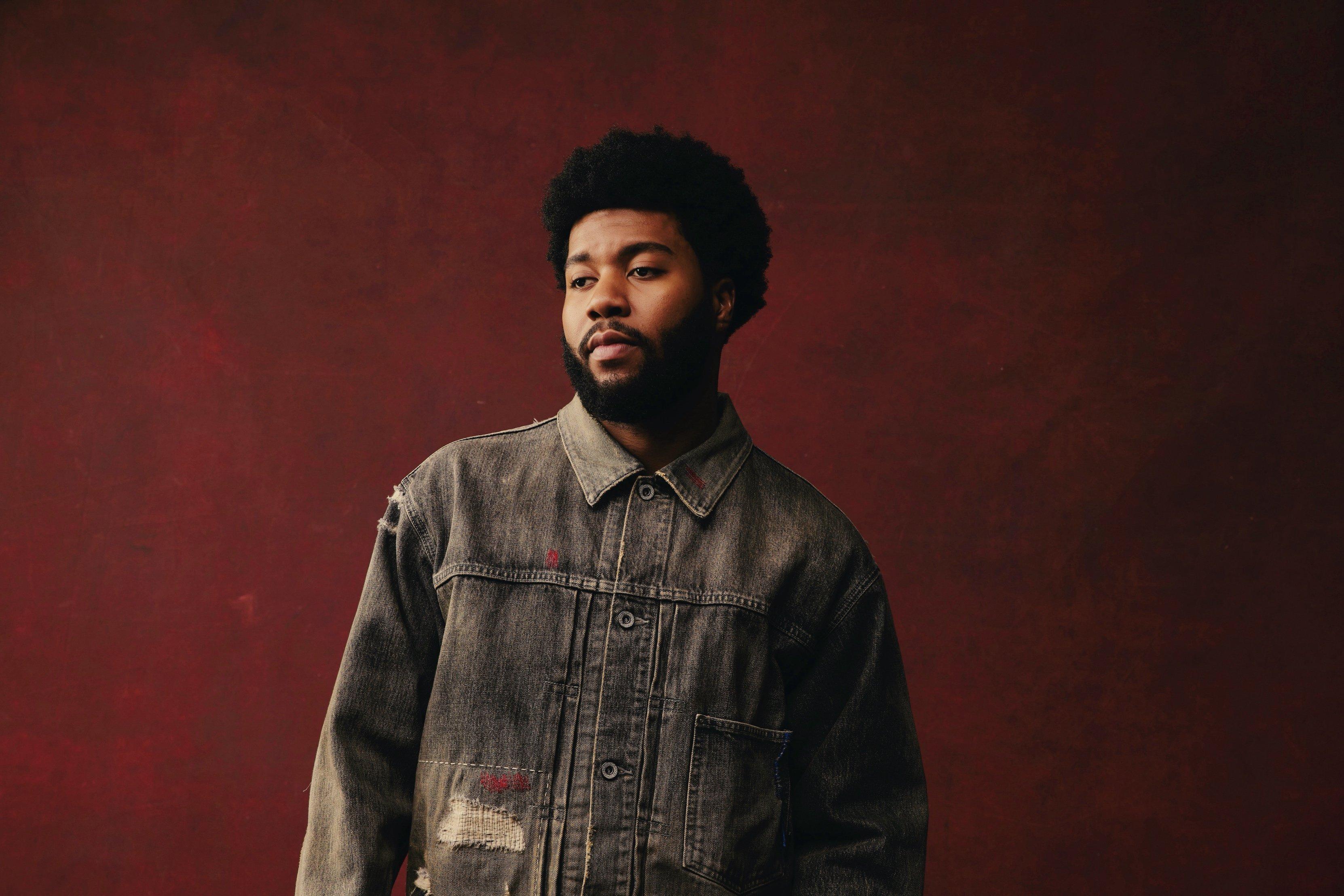
Photo: ro.lexx
news
New Music Friday: Listen To New Songs From Khalid, Mariah Carey, NAYEON, And More
From reworked classics to new fresh tunes, take a listen to some of the most exciting tracks that dropped on June 14.
Those pre-summer Fridays just keep rolling on. With each release day, the music community fills our hard drives, playlists and record shelves with more aural goodness.
Granted, to wrangle it all in one place is impossible — but GRAMMY.com can provide a healthy cross-section of what's out there. From here, venture forth into new releases by Luke Combs (Fathers & Sons), Normani (Dopamine), Moneybagg Yo (Speak Now), Jelly Roll ("I Am Not Okay"), and more.
For now, here are nine new songs or albums to explore.
Khalid — "Adore U"
After previously released single "Please Don't Fall in Love With Me," Khalid is back with another luminous ode to romantic disconnection, where he calls for healing amid broken ties.
"Thousand miles apart and you're still in my heart/ Can we take it back?" Khalid pleads in the hook. "I'm waiting at the start/ Fly me to the moon and now I'm seeing stars when we touch."
Khalid hasn't released a full-length album since 2019's Free Spirit. But he's been teasing a new project for a minute: two weeks ago, he shared an Instagram carousel with the caption "5 years later. Here we go again." And the yearning "Adore U" certainly sets the tone for what's to come in Khalid's world.
NAYEON — 'NA'
TWICE's NAYEON is shifting gears towards her highly anticipated solo comeback with the release of NA, a project that spans pop, dance, and more. The follow-up to her debut solo album, 2022's IM NAYEON, NA provides a glimpse into the TWICE member's transition from being daunted by a solo career to finding comfort in the act.
One highlight is the shimmering "Butterflies," which NAYEON described to Rolling Stone as "one of my favorite songs" yet "one of the harder ones to record, actually." Another is the brassy "Magic," which she calls "a very self-confident song." All in all, NA winningly cements NAYEON's identity — irrespective of her main gig.
Mariah Carey — 'Rainbow: 25th Anniversary Extended Edition'
In light of its 25-year anniversary, Mariah Carey revisits her iconic 1999 album, Rainbow, which featured collaborations with fellow household names like Jay-Z, USHER, and Missy Elliott. The new anniversary edition boasts a plethora of remastered and remixed tracks — a treasure trove for Carey acolytes.
One new track is "Rainbow's End," produced by David Morales; Carey described it as "a hopeful ending to an emotional roller-coaster ride." Elsewhere, there's "There For Me," a love letter to her fans that didn't make the album; a new remix of "How Much" by Jermaine Dupri, and some intriguing live recordings and a cappella tracks.
$UICIDEBOY$ — 'New World Depression'
Since at least their debut album, 2018's I Want to Die in New Orleans, rap duo $UICIDEBOY$ have expertly cataloged the bugs beneath the rock of the human experience: addiction, depression, the whole nine yards. New World Depression is a further distillation of their beautifully filthy aesthetic and worldview.
In highlights like "Misery in Waking Hours" and "Transgressions," MCs $crim and Ruby da Cherry's chroniclings of misery are barer than ever: "Hurts too much to give a f— / Demoralized, always lying, telling people I'll be fine," they rap. Who hasn't felt like this, at one point or another?
John Cale — 'POPtical Illusion'
At 82, Velvet Underground violist, multi-instrumentalist and co-founder John Cale is still a tinkerer, a ponderer, an artist in flux rather than stasis. In 2023, when GRAMMY.com asked when he felt he came into his own as an improviser, he immediately replied "Last year."
That interview was centered around that year's solo album, Mercy, another gem in a solo discography full of them. Now, he's already back with a follow-up, POPtical Illusion.
While POPtical Illusion maintains its predecessors' foreboding, topical nature — and then some — tracks like "Laughing in My Sleep" and "Funkball the Brewster" couch these morose topics in a more playful, irreverent aural palette.
Tanner Adell — "Too Easy"
The Twisters soundtrack continues to be a whirlwind of great tunes. The latest dispatch is Tanner Adell's "Too Easy," a country-pop dance floor banger — its video even featuring a performance by dance troupe the PBR Nashville Buckle Bunnies.
"Too Easy" is the fourth song to be released from the Twisters soundtrack, following Tucker Wetmore's "Already Had It," Megan Moroney's "Never Left Me," Bailey Zimmerman's "Hell or High Water," and Luke Combs' "Ain't No Love in Oklahoma." The full album — which features a hoard of country stars, including Lainey Wilson, Thomas Rhett, Tyler Childers and more — will be available on July 19 when the movie hits theaters.
Stonebwoy — "Your Body"
We've clearly caught Ghanian Afropop star Stonebwoy in a jubilant mood. In a teaser for his new song, "Your Body," the singer born Livingstone Satekia undulates on a saturated, red-and-blue backdrop, foreshadowing the sticky summer days we'll spend jamming the tune.
And the full song certainly doesn't disappoint. Interweaving strains of pop, R&B and reggae, with Stonebwoy deftly switching between singing and rapping, "Your Body" will get your body moving.
Toosii — "Where You Been"
Rapper Toosii last teased his upcoming eighth mixtape, JADED, with "Suffice," its lead single released back in November. In the interim, he's been "locked in perfecting a new look a new sound new everything!" as he shared in an Instagram reel. "I just hope you're ready," he added with star and smile emojis.
Said teaser pointed toward a melancholic, weighty ballad, which ended up being the next release from JADED, "Where You Been." Riding a multidimensional, brain-flipping beat, the song is an immersive, thoughtful banger not to be missed.
Victoria Monét — "Power of Two" (from 'The Acolyte')
The latest Star Wars show on Disney+, "The Acolyte," is getting rave reviews — and three-time GRAMMY winner Victoria Monét is now part of its musical universe. She's contributed an original song, "Power of Two," to the end credits of the Lucasfilm series.
Over an ethereal, melancholic beat, the lyrics detail emotions ripe for either terra firma or a galaxy far, far away: "You thought your soul was a necklace/ That you could wear and take off/ That you could rip and break off/ That you could trade in the dark/ But you're mine."
Bring these killer tunes straight into your weekend — and keep checking GRAMMY.com for more brand-new New Music Friday lists!
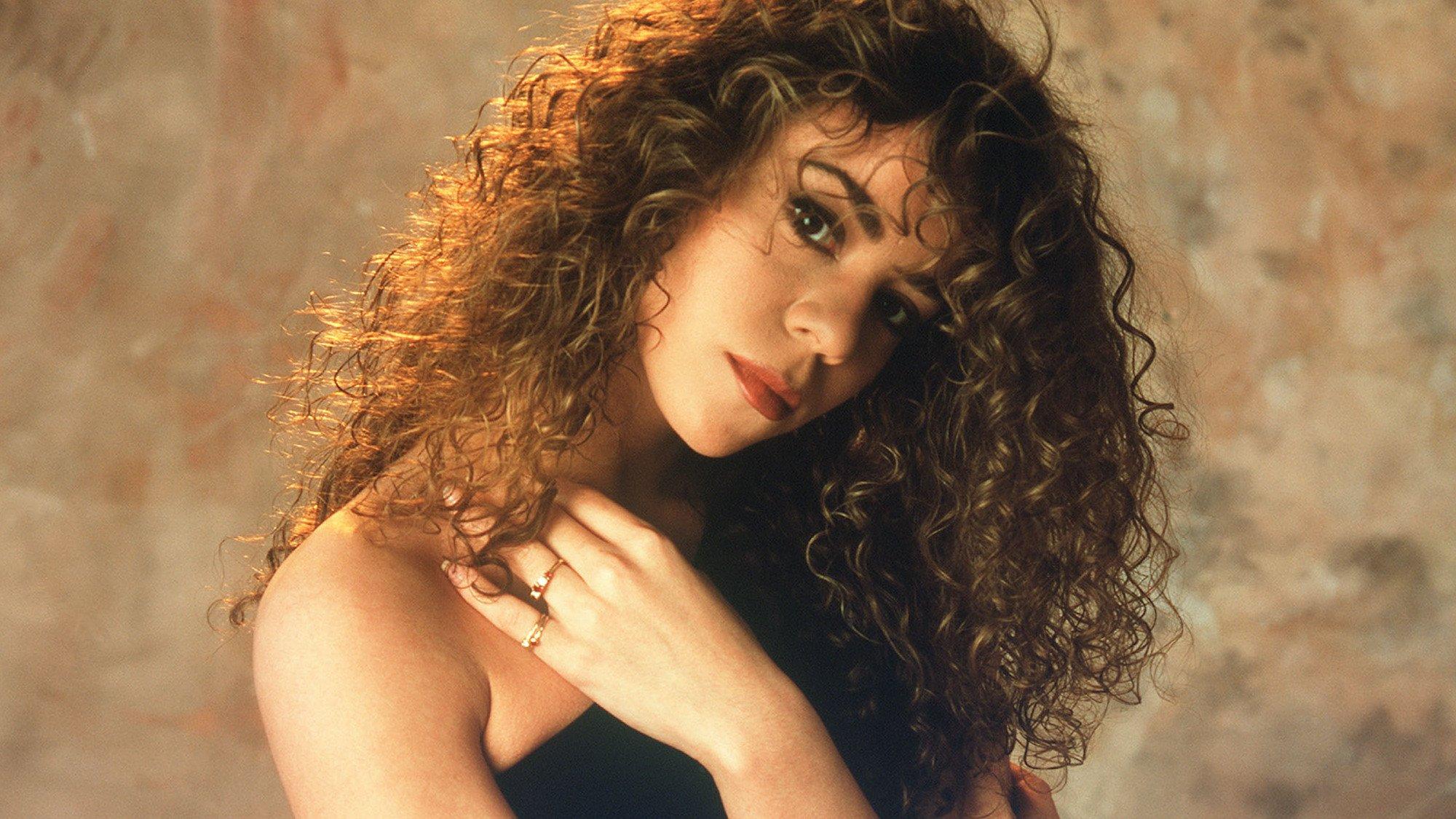
Photo: Frank Micelotta
news
On This Day In Music: Mariah Carey Releases Her Self-Titled Debut Album
Released June 12, 1990, Mariah Carey's iconic debut spent 11 weeks atop the Billboard 200. Revisit the impressive — and GRAMMY-winning — album, which started it all for one of music's great divas.
Years before she was dubbed the "Queen of Christmas" or became the recipient of the Recording Academy's Global Impact Award, Mariah Carey was making a name for herself with R&B earworms and impressive vocal range.
Released 34 years ago today, the New-York native's self-titled debut album featured a tasteful mix of slower, emotional ballads and upbeat anthems. Mariah Carey's lead single, "Vision of Love," offered listeners a first taste of her infamous whistle register and incredible range — it also caught the ear of Academy voters.
Carey was nominated in five categories at the 1991 GRAMMYs, and took home golden gramophones for Best New Artist and Best Pop Vocal Performance, Female. The album broke chart records, established Carey as a household name, and ultimately paved the way for her illustrious career.
"It seems like everything I did in the first year that I came out with my first album is like a blur because everything happened so fast for me and I never had the chance to sit down and go 'Wow, this is actually happening,'" Carey recalled in an interview with MTV. "I just, like, went straight ahead."
The success of Mariah Carey was a mix of fate, talent and perseverance. In 1988, a teenage Carey left her family home in Long Island to pursue a music career. She brought with her a four-song demo tape made during her high school years with songwriter/producer Ben Marguiles (who also co-wrote Mariah Carey with several other writers). She continued to shape up the demo tape as she worked multiple jobs, and eventually crossed paths with Latin GRAMMY winner Brenda K. Starr.
Carey found herself singing back-up vocals for the artist at live performances, and caught Starr's attention with her astonishing voice. Recognizing her exceptional talent, Starr played a pivotal role in launching Carey's career to new heights.
"I really didn't want to do it, but I said it's gotta be better than what I'm doing now," Carey confessed of the audition in Chris Nickson's book, Mariah Carey Revisited: Her Story. "So I went to the audition, and Brenda was such a great person."
Eventually, Starr brought Carey along to an industry party, where she was able to get her demo tapes into the hands of Tommy Mottola, the then-president of Columbia Records. With stars in his eyes, Mottola listened to the tape and quickly signed Carey to the label.
Upon the album's release, critics overwhelmingly praised 20-year-old Carey's vocal prowess, noting how her debut set a new standard that raised expectations for artists across various genres to follow. The New York Times noted that the release came with "more fanfare and promotional hoopla than [Columbia Records] has bestowed on a new young talent in years." The paper continued to lavish praise on Carey's "pop-gospel voice that is impressive in its power and range and that has elaborate vocal embellishments strikingly reminiscent of Whitney Houston's."
The album featured a whopping four Hot 100 chart-toppers: "Vision of Love," "Love Takes Time," "Someday," and "I Don't Wanna Cry." The album itself spent 11 weeks atop the Billboard 200 — Carey's lengthiest No. 1 to date.
Twenty-four years and 15 studio albums later, Mariah Carey transcends time. The album not only serves as representation of Carey’s unwavering determination, but a formative piece of art that jump started a truly spectacular career. While the five-time GRAMMY winner is duly given her flowers for her complex and sprawling catalog, an equal sized bouquet should be laid at the feet of her debut album, which remains a timeless paragon for R&B artists to draw inspiration from.
More Mariah Carey News & Music

New Music Friday: Listen To New Songs From Halsey, MGK And Jelly Roll, XG & More

Ayoni Performs "Bitter In Love"

Watch Stevie Wonder Win Album Of The Year
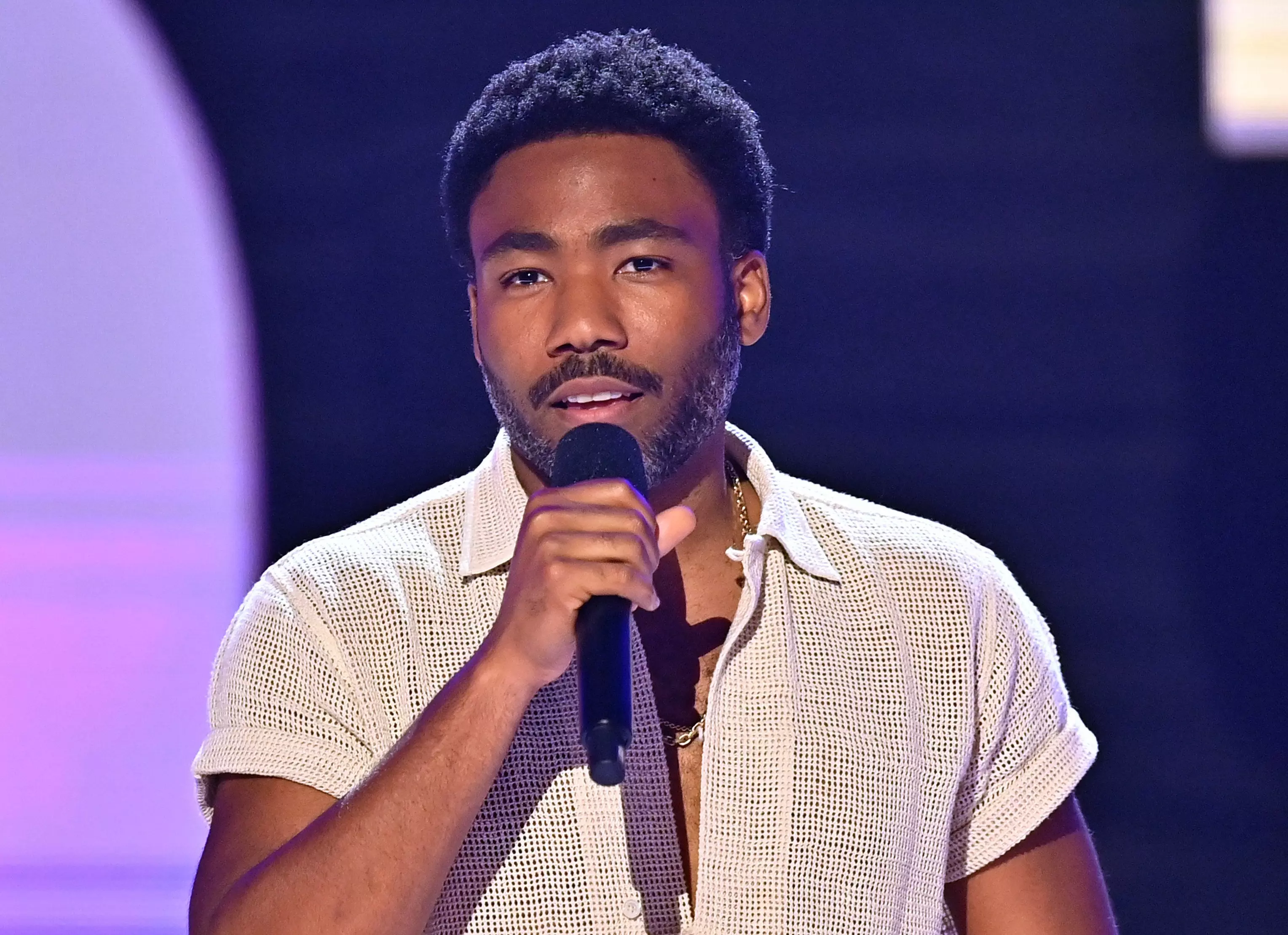
New Music Friday: Listen To New Releases From Childish Gambino, JT, Rauw Alejandro & More

Meet Amy Allen, The Hitmaking Singer/Songwriter Behind Sabrina Carpenter's "Please Please Please" & More Pop Gems
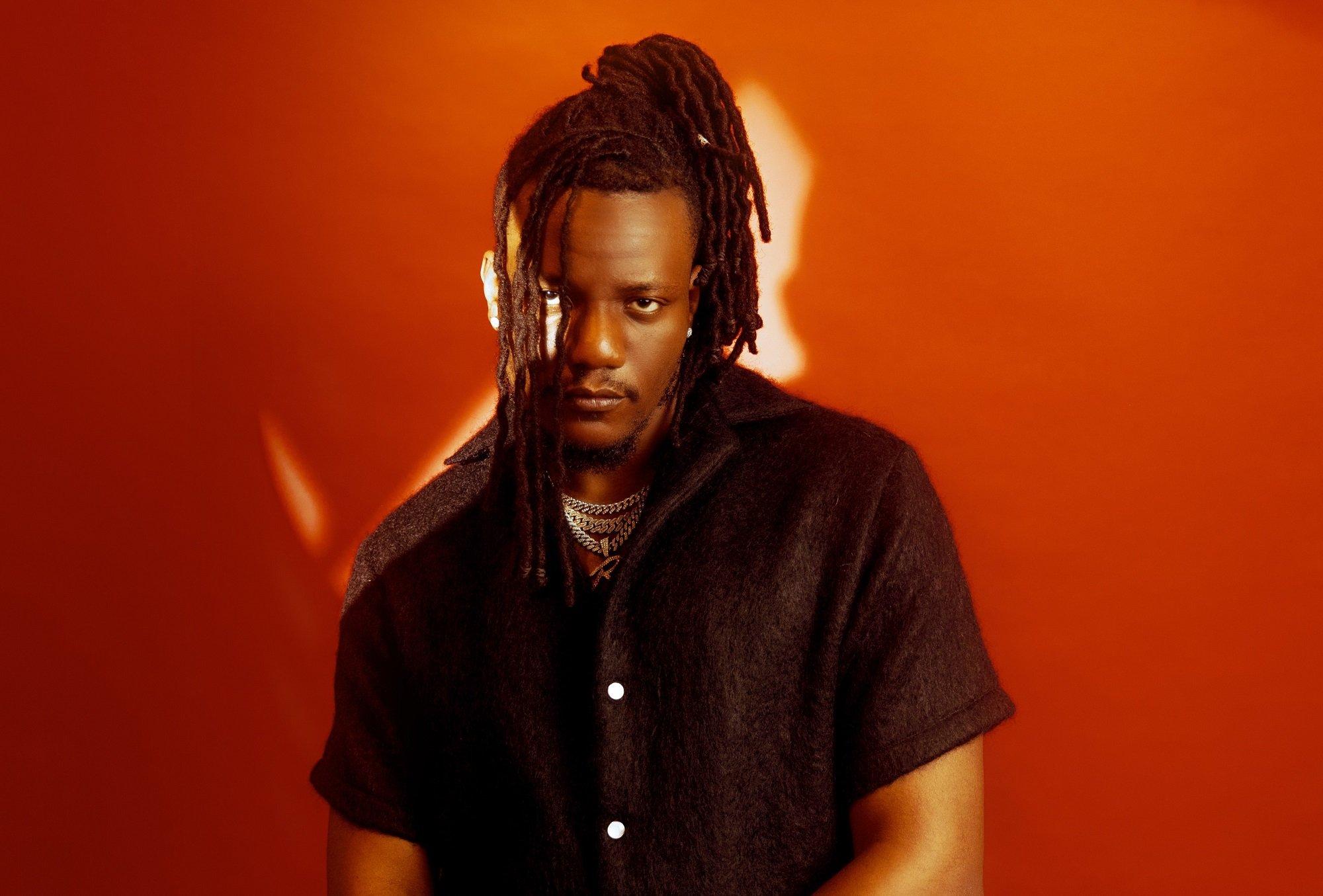
Photo: Williams Peters
interview
Meet Usher Collaborator Pheelz, The Nigerian Producer & Singer Who Wants You To 'Pheelz Good'
After working with Usher on two tracks for his latest album, 'Coming Home,' Lagos' Pheelz is looking inward. His new EP, 'Pheelz Good II' drops May 10 and promises to be an embrace of the artist's unabashed self.
If you were online during the summer of 2022, chances are you’ve heard Pheelz’s viral hit single "Finesse." The swanky Afro-fusion track (featuring fellow Nigerian artist Bnxn) ushered in a world of crossover success for Pheelz, who began his career as a producer for the likes of Omah Lay, Davido, and Fireboy DML.
Born Phillip Kayode Moses, Pheelz’s religious upbringing in Lagos state contributed to his development as a musician. He manned the choir at his father’s church while actively working on his solo music. Those solo efforts garnered praise from his peers and music executives, culminating in Pheelz's debut EP in 2021. Hear Me Out saw Pheelz fully embrace his talent as a vocalist, songwriter, and producer.
"I feel important, like I’m just molding clay, and I have control over each decision," Pheelz tells GRAMMY.com about creating his own music.
2022 saw the release of the first two tapes in his Pheelz Good trilogy: Pheelz Good I and Pheelz Good (Triibe Tape), which was almost entirely self-produced. The 29-year-old's consistency has paid off: he produced and sang on Usher’s "Ruin," the lead single from his latest album Coming Home, and also produced the album's title track featuring Burna Boy. But Pheelz isn't only about racking up big-name collaborators; the self-proclaimed African rockstar's forthcoming projects will center on profound vulnerability and interpersonal honesty. First up: Pheelz Good II EP, out May 10, followed by a studio album in late summer.
Both releases will see the multi-hyphenate "being unapologetically myself," Pheelz tells GRAMMY.com. "It will also be me being as vulnerable as I can be. And it’s going to be me embracing my "crayge" [crazy rage]...being myself, and allowing my people to gravitate towards me."
Ahead of his new project, Pheelz spoke with GRAMMY.com about his transition from producer artist, designing all his own 3D cover art, his rockstar aesthetic, and what listeners can expect from Pheelz Good II.
This interview has been edited for clarity.
What sparked your transition from singing in church to realizing your passion for creating music?
For me, it wasn’t really a transition. I just always loved making music so for me I felt like it was just wherever I go to make music, that’s where I wanna be. I would be in church and I was the choirmaster at some point in my life, so I would write songs for Sunday service as well. And then I would go to school as well and write in school, and people heard me and they would love it. And I would want to do more of that as well.
A friend of my dad played some of my records for the biggest producers in Nigeria back then and took me on as an intern in his studio. I guess that’s the transition from church music into the industry. My brothers and sisters were in the choir, but that came with the job of being the children of the pastor, I guess. None of them really did music like me; I’m the only one who took music as a career and pursued it.
You made a name for yourself as a producer before ever releasing your music, earning Producer Of The Year at Nigeria’s Headies Awards numerous times. What finally pushed you to get into the booth?
I’ve always wanted to get into the booth. The reason why I actually started producing was to produce beats for songs that I had written. I’ve always been in the booth, but always had something holding me back. Like a kind of subconscious feeling over what my childhood has been. I wasn’t really outspoken as a child growing up, so I wouldn’t want people to really hear me and would shy away from the camera in a sense. I think that stuck with me and held me back.
But then COVID happened and then I caught COVID and I’m like Oh my god and like that [snaps fingers] What I am doing? Why am I not going full steam? Like why do I have all this amazing awesomeness inside of me and no one gets to it because I’m scared of this or that?
There was this phrase that kept ringing in my head: You have to die empty. You can’t leave this earth with all of this gift that God has given you; you have to make sure you empty yourself. And since then, it’s just been back-to-back, which just gave me the courage.
How did you react to " Finesse" in former President Barack Obama’s annual summer playlist in 2022?
Bro, I reacted crazy but my dad went bananas. [Laughs.] I was really grateful for that moment, but just watching my dad react like that to that experience was the highlight of that moment for me. He's such a fan of Barack Obama and to see that his son’s music is on the playlist, it just made his whole month. Literally. He still talks about it to this day.
Experiences like that just make me feel very grateful to be here. Life has really been a movie, just watching a movie and just watching God work and being grateful for everything.
At first he [my dad] [didn’t support my career] because every parent wants their child to be a doctor, a lawyer, or an engineer. But when he saw the hunger [I have], and I was stubborn with [wanting] to do music, he just had to let me do it. And now he’s my number one fan.
Your latest single, "Go Low" arrived just in time for festival season. What was it like exploring the live elements of your art at SXSW and your headlining show in London at the end of April?
I have always wanted to perform live. I’ve always loved performing; Pheelz on stage is the best Pheelz. Coming from church every Sunday, I would perform, lead prayers and worship, so I’ve always wanted to experience that again.
Having to perform live with my band around the world is incredible man. And I’ll forever raise the flag of amazing Afro live music because there’s a difference, you know? [Laughs.] There are so many elements and so many rhythms and so many grooves
I’ve noticed that much of your recent cover art for your singles and EPs is animated or digitally crafted. What’s the significance, if any, of this stylistic choice?
It still goes back to my childhood because I wasn’t expressive as a child; I wouldn’t really talk or say how I felt. I’d rather write about it, write a song about it, write a poem about it, or draw about it. I’d draw this mask and then put how I’m feeling into that character, so if I was angry, the mask would be raging and just angry.
The angry ones were the best ones, so that stuck with me even after I started coming out of my shell and talking and being expressive; that act of drawing a mask still stuck with me. And then I got into 3D, and I made a 3D version of the mask and I made a 3D character of the mask. So I made that the main character, and then I just started making my lyric videos, again post-COVID, and making them [lyric videos] to the characters and making the actual video mine as well.
In the future, I’m gonna get into fashion with the characters, I’m gonna get into animation and cartoons and video games, but I just wanna take it one step at a time with the music first. So, in all of my lyric videos, you get to experience the characters. There’s a fight [scene] among them in one of the lyric videos called "Ewele"; there is the lover boy in the lyric video for "Stand by You"; there are the bad boys in the lyric video for "Balling." They all have their own different characters so hopefully in the near future, I will get to make a feature film with them and just tell their story [and] build a world with them. I make sure I put extra energy into that, make most of them myself so the imprint of my energy is gonna be on it as well because it’s very important to me.
You and Usher have a lengthy working relationship. You first performed together in 2022 at the Global Citizen Festival, then produced/co-wrote "Coming Home" and "Ruin." Take us through the journey of how you two began collaborating.
It started through a meeting with [Epic Records CEO] L.A. Reid; he was telling me about the album that they were working on for Usher and I’m like, "Get me into the studio and lemme see what I can cook up." And they got me into the studio, [with Warner Records A&R] Marc Byers, and I wrote and produced "Coming Home." I already had "Ruin" a year before that.
["Ruin"] was inspired by a breakup I just went through. Some of the greatest art comes from pain, I guess. That record was gonna be for my album but after I came home I saw how L.A. Reid and Usher reacted and how they loved it. I told them, "I have this other song, and I think you guys would like it for this album." And I played "Ruin," and the rest was history.
Before your upcoming EP, you’ve worked with Pharrell Williams, Kail Uchis, and the Chainsmokers in the studio. What do you consider when selecting potential collaborators?
To be honest, I did not look for these collabs. It was like life just brought them my way, because for me I’m open to any experience. I’m open to life; I do it the best I can at any moment, you understand?
Having worked with Pharrell now, Dr. Dre, Timbaland, and the Chainsmokers, I’m still shocked at the fact that this is happening. But ultimately, I am grateful for the fact that this is happening. I am proud of myself as well for how far I’ve come. Someone like Timbaland — they are literally the reason why I started producing music; I would literally copy their beats, and try to sound like them growing up.
[Now] I have them in the same room talking, and we’re teaching and learning, making music and feeding off of each others’ energy. It’s a dream come true, literally.
What's it like working with am electro-pop group like the Chainsmokers? How’d you keep your musical authenticity on "PTSD"?
That experiment ["PTSD"] was actually something I would play with back home. But the crazy thing is, it’s gonna be on the album now, not the EP. I would play it back home, like just trying to get the EDM and Afrohouse world to connect, cause I get in my Albert Einstein bag sometimes and just try and experiment. So when I met the Chainsmokers and like. "Okay, this is an opportunity to actually do it now," and we had a very lengthy conversation.
We bonded first as friends before we went into the studio. We had an amazing conversation talking about music, [them] talking about pop and electronic music, and me talking about African music. So it was just a bunch of producers geeking out on what they love to do. And then we just talk through how we think the sound would be like really technical terms. Then we get into the studio and just bang it out. Hopefully, we get to make some more music because I think we can create something for the world together.
I’ve noticed you dress a bit eccentrically. Have you always had this aesthetic?
I’ve always dabbled in fashion. Even growing up, I would sketch for my sister and make this little clothing, so like I would kick up my uniform as well, make it baggy, make it flare pants, make it fly.
I think that stuck with me until now, trying different things with fashion. And now I have like stylists I can talk to and throw ideas off of and create something together. So yeah, I want to get into the fashion space and see what the world has in store for me.
What can fans expect as you’re putting the finishing touches on your upcoming EP Pheelz Good II and your album?
Pheelz Good II, [will be] a close to the Pheelz Good trilogy of Pheelz Good I, Pheelz Good Triibe Tape and Pheelz Good II. The album is going to be me being unapologetically myself still. But it will also be me being as vulnerable as I can be.
It’s going to be me embracing my crayge [crazy rage]. Like just embracing me unapologetically and being me, being myself, and allowing my people to gravitate towards me, you get me. But I’m working on some really amazing music that I am so proud of. I’m so proud of the EP and the album.
Mr. Eazi’s Gallery: How The Afrobeats Star Brought His Long-Awaited Album To Life With African Art
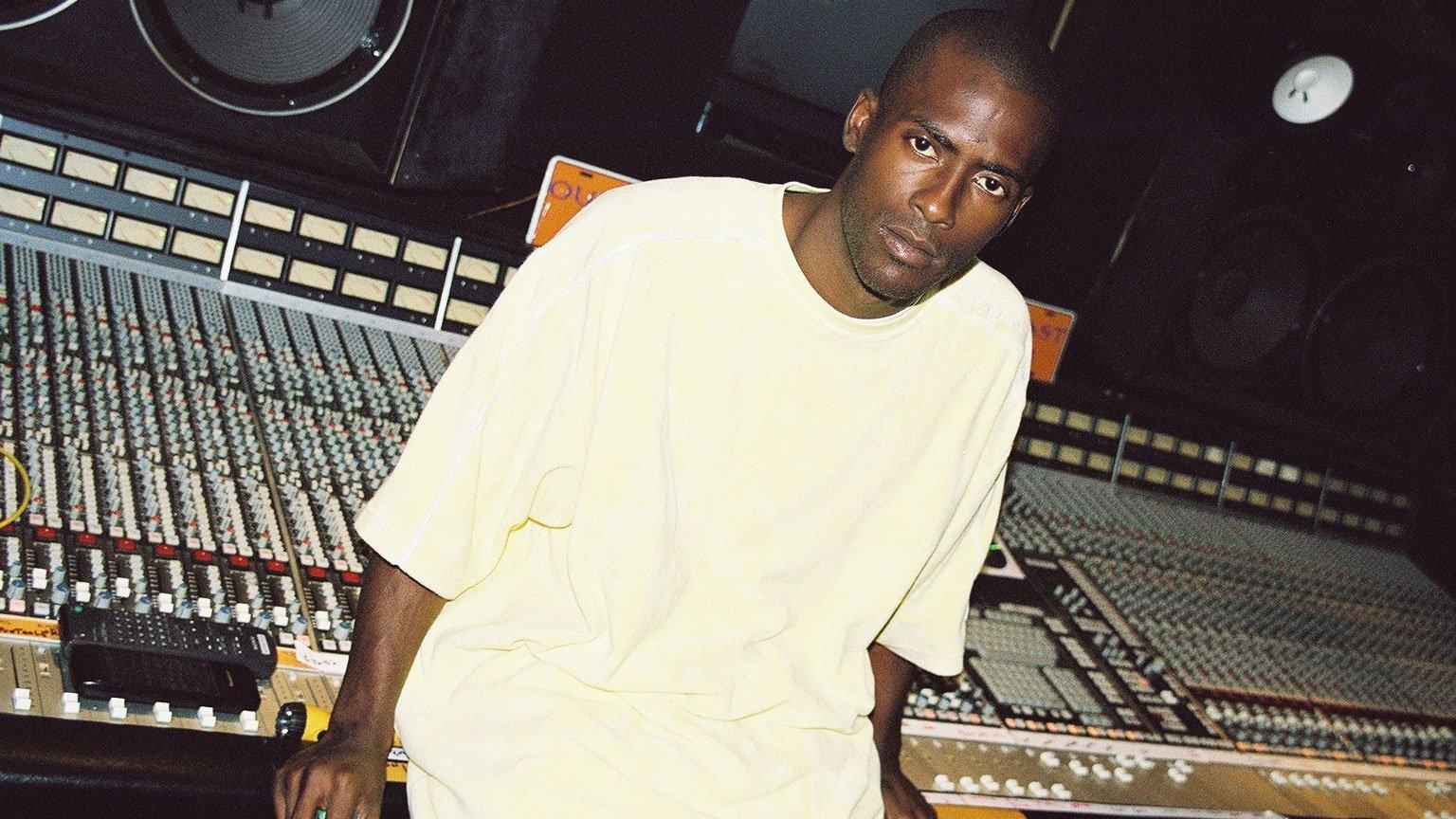
Photo: Julia Beverly/Getty Images
news
Remembering Producer Rico Wade, Helped Define The Sound Of Southern Hip-Hop
Rico Wade, legendary producer and one-third of Organized Noize, who helped forge the sound of Atlanta hip-hop and propelled artists like OutKast, Ludacris, and TLC to fame, has died at 52.
Hip-hop has lost another legend. Rico Wade, an integral part of the bedrock of Southern hip-hop, the godfather of modern Atlanta rap, and one-third of the production crew Organized Noize with Patrick "Sleepy" Brown and Ray Murray, has died. He was 52.
Wade was a force that helped launch the careers of OutKast, Goodie Mob, Ludacris, and Future, and produced and co-wrote hits for artists including TLC's "Waterfalls," as part of a mid-'90s Southern hip-hop renaissance. The epicenter of this revolution was the Dungeon, his mother's basement in East Point, Georgia. The location built a reputation as a haven for Dungeon Family artists like André "André 3000" Benjamin and Antwan "Big Boi" Patton among a generation of ATL creatives formulating their own flavor of Southern rap.
"We're deeply saddened by the passing of Rico Wade, one of Atlanta’s most prolific music producers," said Recording Academy CEO Harvey Mason jr. "Rico's influential contributions to the Atlanta music scene beginning in the 1990s helped foster the rise of some of hip-hop’s most prominent artists and played a pivotal role in shaping the genre as we know it today. Our hearts go out to his family, friends, and all those whose lives he influenced.”
Wade was nominated for two GRAMMYs during his lifetime including Record Of The Year for TLC's "Waterfalls" and Album Of The Year for OutKast's Stankonia.
“Rico left an indelible mark on music and culture around the world and for that, the South will always have something to say,” said Atlanta Mayor Andre Dickens in an issued statement echoing the famous battle cry of André 3000's 1995 Source Awards Best New Artist acceptance speech.
It's been more than 30 years since OutKast dropped their first-ever single "Player's Ball" in 1993 and on that track Wade's voice is the first. He sets the tone for the legendary duo's entire career and Southern hip-hop at the same time with the introduction: "Man, the scene was so thick/ Lowriders, '77 Sevilles, El Dogs/ Nothin' but them 'Lacs/ All the players, all the hustlers/ I'm talkin' 'bout a Black man heaven here/ You know what I'm sayin'?"
"Rico Wade brought us to his house studio, where I heard the most interesting music production I'd ever heard from Atlanta," André 3000 told the Recording Academy in a 2019 interview reflecting on his experience working on OutKast's debut album Southernplayalisticadillacmuzik. "It was Rico, Ray, and Sleepy's vision to make sure [OutKast would put] Southern lifestyle first. I was just playing my part the best I could."
Outkast's Southernplayalisticadillacmuzik would go on to sell 500,000 records and became certified platinum within a year. "When we were working on the OutKast vibe, even though there were two members in the group, we all considered ourselves OutKast at the time — including all of Organized Noize and the Goodie Mob members who appeared on the album," Murray told the Recording Academy in 2019.
Read more: OutKast Examine Their Southern Experience On 'Southernplayalisticadillacmuzik'
Organized Noize signed a publishing deal with L.A. Reid and Babyface's label LaFace Records in 1993, setting the foundation for their work on OutKast's seminal "Player's Ball" single. It was a lasting connection that would serve the rest of Wade's career.
Wade would continue to work with Reid during Reid's tenure as chairman and CEO of Epic Records from 2013 to 2017, building a hub for hip-hop artists at the label including Wade's cousin, Atlanta rapper Future. Future would become the first artist ever on the Billboard charts to debut back-to-back albums at No. 1 with his 2017 release HNDRXX. In March, Future and Metro Boomin jointly released another No.1 album, We Don’t Trust You.
Wade nurtured Future's talents through his Dungeon connects. The two didn't meet until Future was well into his teens, but once they did Wade quickly put his cousin's clear drive and talent to use, introducing him to the Dungeon Family and bringing him into the studio to work on in-house production projects including Ludacris' "Blueberry Yum Yum" (Red Light District), which earned Future a songwriting credit in 2004.
“That's how he ended up writing the record for Ludacris, becoming part of a group that could make music, and getting a record deal,” Wade told Complex in 2013. “It showed him that the music industry money is real."
Inspired by his cousin, Future studied the industry through the in-roads made by Wade. “I took everything I learned from him and applied it to my everyday craft from being in the studio,” Future told Complex. "Just knowing how to feel records so I know how to make songs and write for people to keep around and go to the next level.” His devotion to Wade's tutelage and legacy is apparent in the Olde English script tattooed across his arms that matches Wade's own markings — "DUNGEON" appears on the right and "FAMILY" on the left.
Killer Mike, a constant collaborator who worked with Wade on his latest album Michael which swept the 2024 GRAMMYs rap categories with three wins for Best Rap Album, Best Rap Song, and Best Rap Performance, announced Wade's passing in an Instagram post on Sunday. "I don't have the words to express my deep and profound sense of loss. I am Praying for your wife and Children. I am praying for the Wade family. I am praying for us all," Killer Mike wrote. "I deeply appreciate your acceptance into The Dungeon Family, mentorship, Friendship and Brotherhood. Idk where I would be without ya'll."
